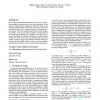Free Online Productivity Tools
i2Speak
i2Symbol
i2OCR
iTex2Img
iWeb2Print
iWeb2Shot
i2Type
iPdf2Split
iPdf2Merge
i2Bopomofo
i2Arabic
i2Style
i2Image
i2PDF
iLatex2Rtf
Sci2ools
WWW
2004
ACM
2004
ACM
Ranking the web frontier
The celebrated PageRank algorithm has proved to be a very effective paradigm for ranking results of web search algorithms. In this paper we refine this basic paradigm to take into account several evolving prominent features of the web, and propose several algorithmic innovations. First, we analyze features of the rapidly growing "frontier" of the web, namely the part of the web that crawlers are unable to cover for one reason or another. We analyze the effect of these pages and find it to be significant. We suggest ways to improve the quality of ranking by modeling the growing presence of "link rot" on the web as more sites and pages fall out of maintenance. Finally we suggest new methods of ranking that are motivated by the hierarchical structure of the web, are more efficient than PageRank, and may be more resistant to direct manipulation. Categories and Subject Descriptors H.3.3 [Information Systems]: Information Search and Retrieval General Terms Algorithms, Th...
Celebrated Pagerank Algorithm | General Terms Algorithms | Internet Technology | Web Search Algorithms | WWW 2004 |
Related Content
| Added | 22 Nov 2009 |
| Updated | 22 Nov 2009 |
| Type | Conference |
| Year | 2004 |
| Where | WWW |
| Authors | Nadav Eiron, Kevin S. McCurley, John A. Tomlin |
Comments (0)

